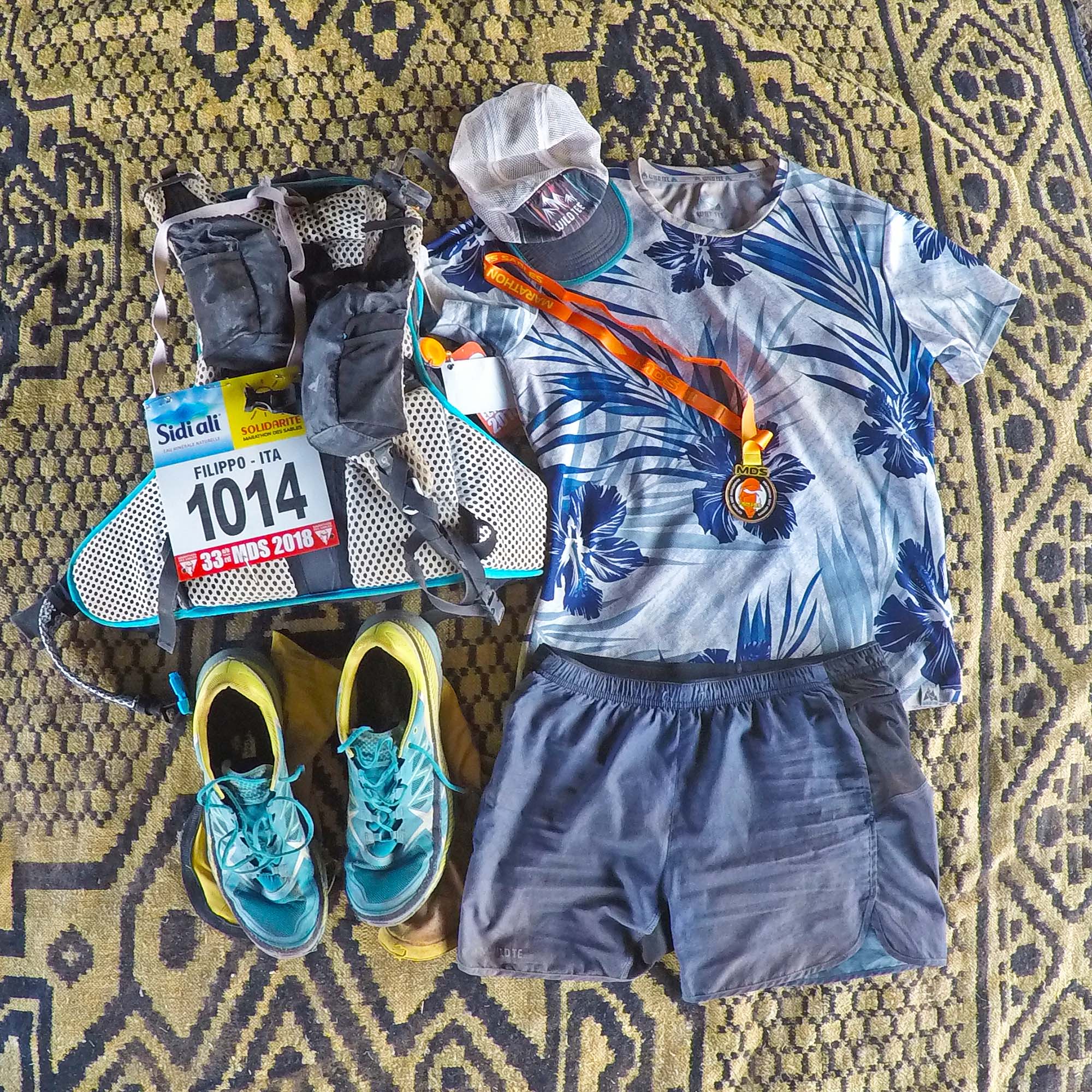The Marathon des Sables is not a race.
That's the first thing Paolo (Zubani, the MdS contact person for Italy, this was his 30th edition) said to me when we arrived at the bivouac: if you’ve come here to race you haven't f***ing understood anything. And I, as always, hadn't f***ing understood anything!
In the short time preceding the race start I did my best to prepare myself physically. I managed to run for two hours, at over ten kilometres per hour, with seven kilos on my shoulders, on the treadmill, in a temperature of thirty degrees. A gruesome scene for anyone watching me in the gym. (See the article on treadmill training).
One day I ran to and from the office with the backpack that is now an integral part of my back. Thirty-four kilometres each way, almost like the eighty-six kilometre monster leg on the fourth day of the race.
In one week, I manage to cover one hundred and ninety kilometres with only one day's rest.
I feel like I'm ready.
Instead, like a fool, I have completely neglected all aspects of managing self-sufficiency for the seven days of the race.
Two days before the start, I panic.
I have ordered some items of the obligatory equipment on the Internet and they are taking a long time to arrive, I have only tested gaiters once, I haven’t treated my feet to prevent sand blisters, I have never tried to run with a rucksack with everything I need for seven days, I must finish preparing the food and, above all, try to make it all fit in the rucksack.
I'm so far behind that it's no longer a question of trying to reduce weight but just trying to have everything I might need so that I don't get too hungry during the day and too cold at night.
Barely ten minutes before the departure of the Malpensa Express train, I decide to stuff my backpack with everything I’d planned to carry. The material is so compressed that, as I laboriously close the main zip, a vacuum-packed bag of food explodes, greasing all the food for the third race day. I try to wash everything and vacuum pack the food again, but will it still be edible in five days? I miss my train and warn the other members of the Italian expedition of my delay.
Finally, we arrive in Quarzazate at two in the morning and after a few hours we board the bus that takes us to the bivouac. Whatever happens, I have sacrificed a lot for this and now I want to live the adventure to its fullest extent. The light and the clean air of Morocco are magnificent and they help me cope with the thousand worries that grip me.
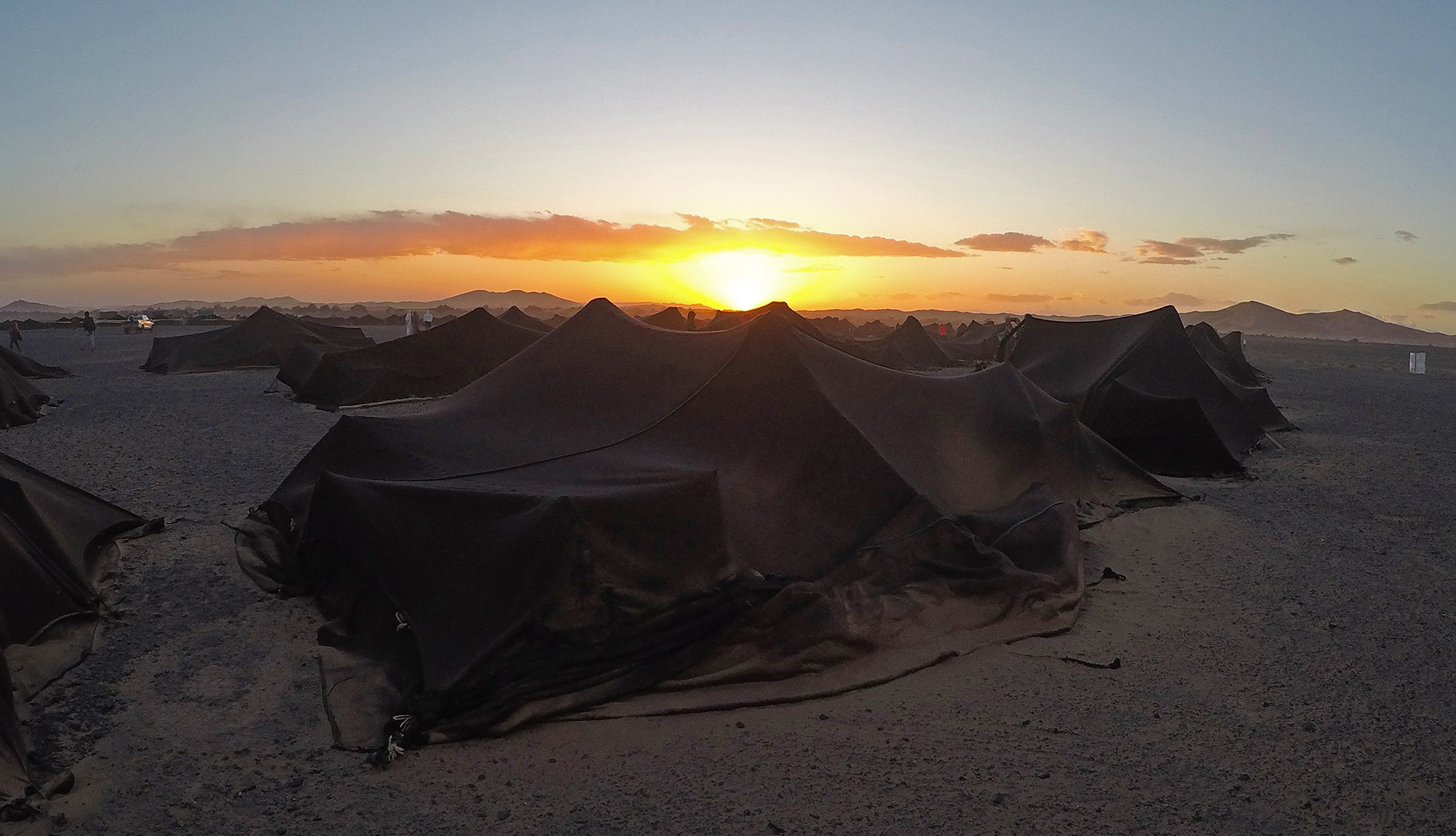
The bivouac is very spartan, we settle in our Berber tent, everyone carrying their own doubts and thoughts. Each of us is here for his or her own personal reason, it remains to be seen whether this motivation will be enough to get us to the arrival of the sixth and final stage.
We spend the first night still accompanied by the suitcase that we will drop off the next day. On the one hand it allows us to consider what we might need, but on the other it fuels our doubts about what to bring. In fact, the next day I undo and redo my backpack another forty times, then finally the time comes to check it. Mine is one of the heaviest, eight kilos and seven hundred grams without camera and water, which means that it will easily weigh ten kilos at the start.
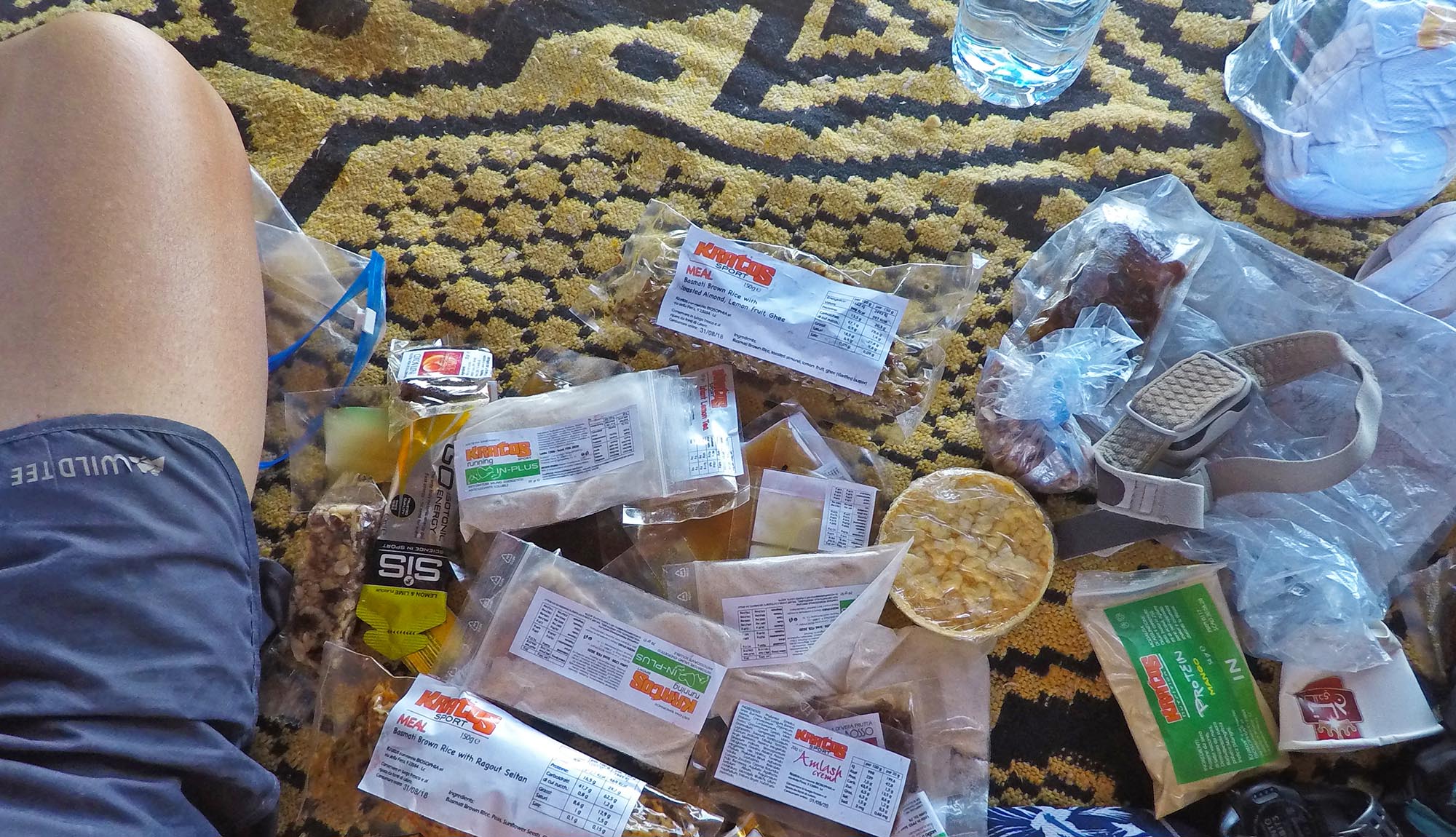
It's the key moment of the whole MdS lark. I switch off and leave the phone behind. I can't remember another time when I was so disconnected from the rest of the world and from work. Fortunately, I brought products I can trust. What I have in my backpack is what will have to last for seven days; if something is missing I will have to make do, while if I have too much I will have to carry it on my back. This certainty is somewhat reassuring and, strangely enough, I serenely fall asleep with the starry sky glued to my face.
The night is warm until two o'clock, then the cold gets me, I realise that my equipment is inadequate and I decide to take the cotton T-shirt with me, an item I was thinking of giving to the guys dismantling the camp. Room service is not the best: at five o'clock they wake us up by uprooting, in a cloud of dust, the tent cover from our heads and we remain in our sleeping bags, on the sand, in a cloud of dust. There is not even time to complain: everyone starts heading off.
The first stage is the easiest, at least on paper; I try to find my rhythm without getting crushed by the rucksack. Around me, everyone is running very fast and light. Every time the sand gets softer, I sink and no matter how hard I push I can't move forward. It is quite frustrating. I begin to suspect that the others have inflated their backpacks with helium used for fairground balloons.
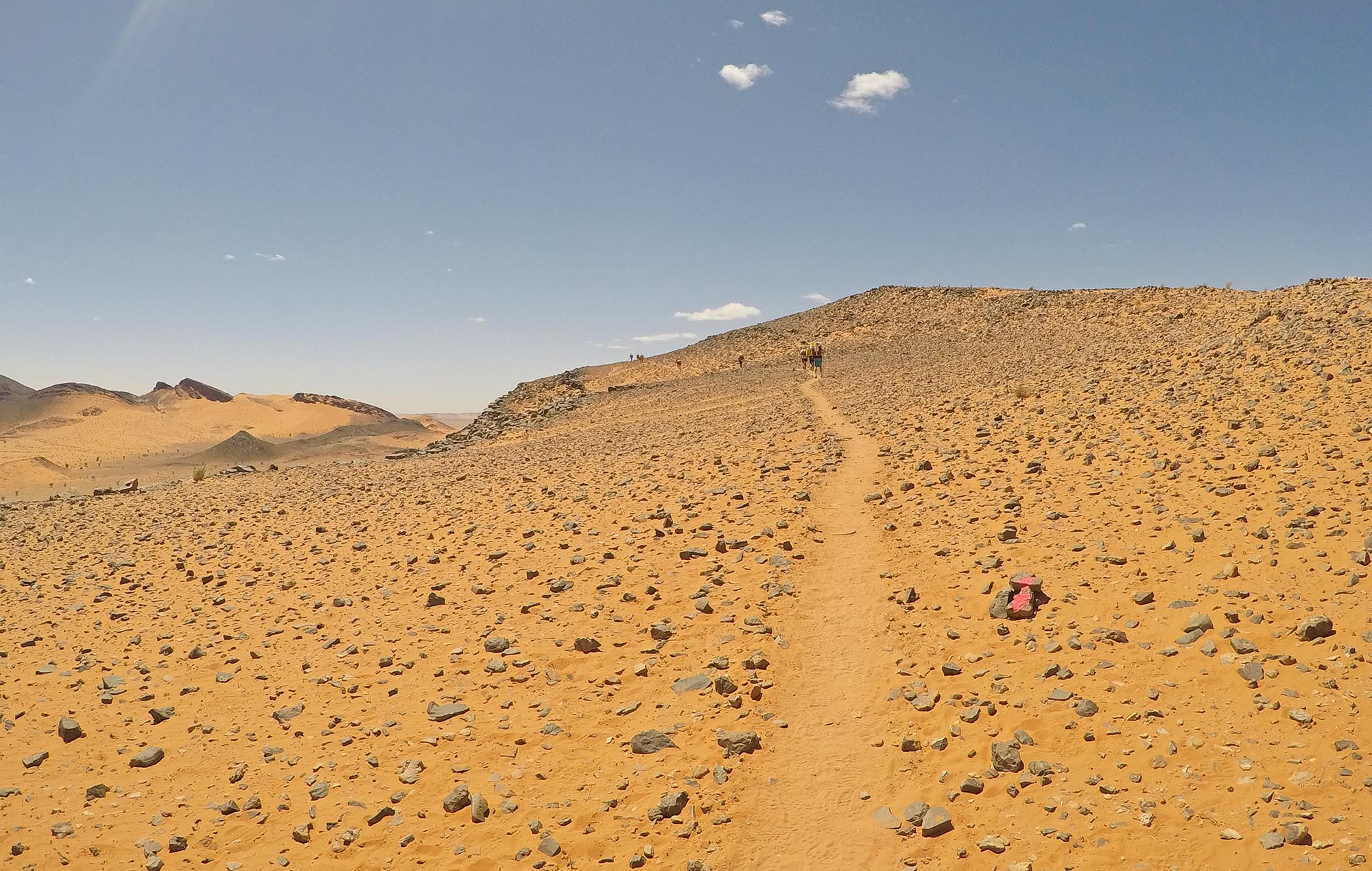
I watch the battle for the top positions in the women's ranking. It's like watching felines assessing each other before the final fight. At the arrival of the stage a twist in the plot (this will define the rankings): a check is made on the rucksack and the first female to arrive is penalised for not carrying the mandatory equipment; the second with a rucksack bigger than her has everything she needs, while the third arrives with a companion to assist her. I leave the checkpoint disgusted and head for our tent with my four bottles of water; the camp is still empty, the silence of the desert wonderful and the moment when I take off my backpack, to lie down on the ground, magical. Perhaps, I think, moments like that are worth all the hassle.
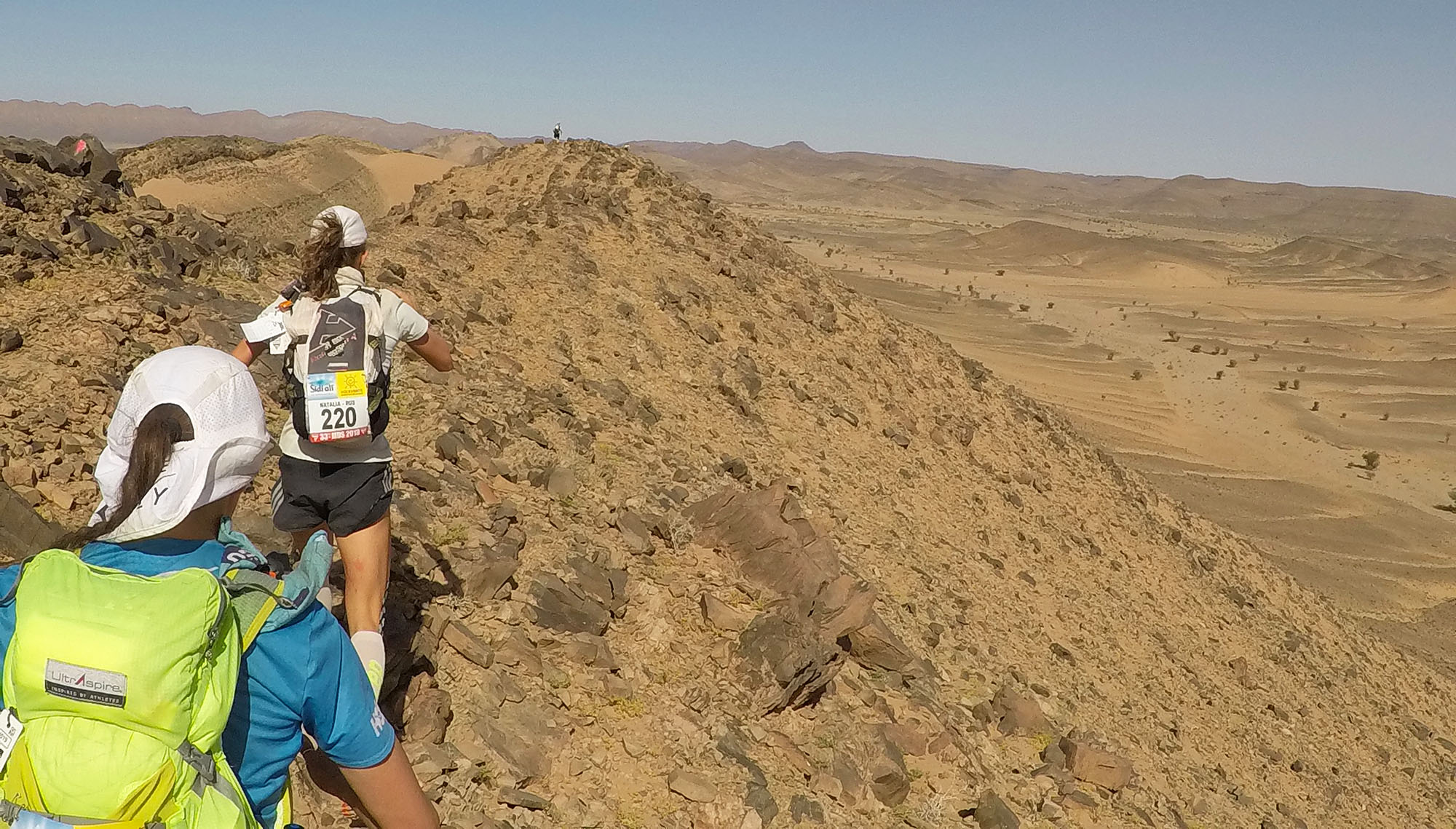
One by one, all the occupants of our three tents arrive, each at their own pace but all with the smile of someone who can tick off a stage off their roadbook. Actually, taken by an insane need to lighten my backpack, I tear out the pages covering the first stage and use them to light a fire, in the best tradition of Pacific Crest Trail hikers.
Before darkness arrives, we gather under our tent for dinner. Everyone follows their own eating strategies, ranging from astronaut-inspired liquid food to beer accompanying spicy sardines. We all try to share with each other the most prized item in our stash. Eight people who do not know each other, so very different but ready to do anything to help each other out. As the sun sets, the camp becomes silent and everyone tries to confront their thoughts before falling asleep.
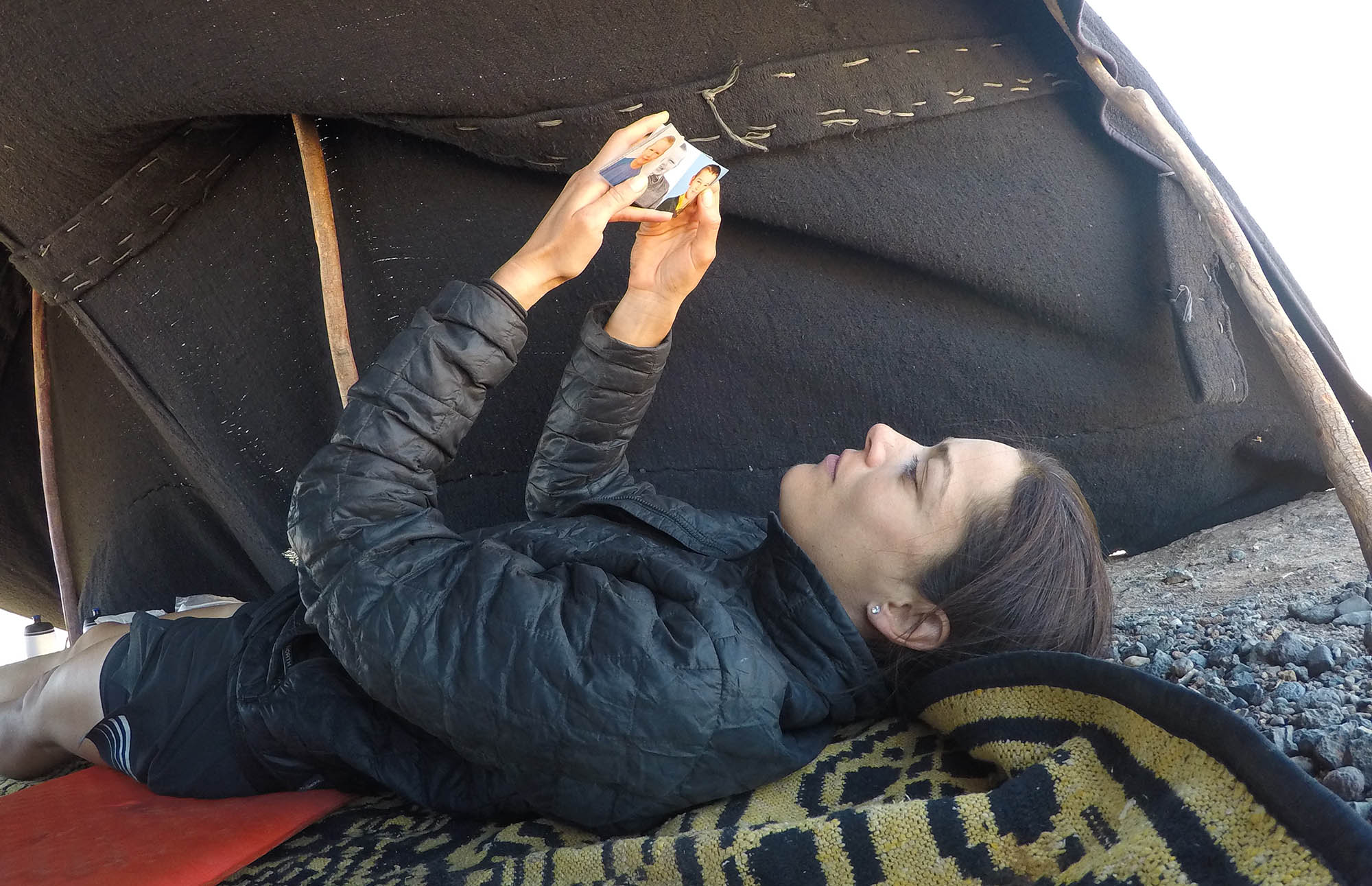
At night it is cold, very cold. Around four o'clock I wake up, I can't sleep anymore, I put on all I have and wrap myself in my sleeping bag, leaving only an opening to breathe through my nose.
The second stage is one of the most demanding with a lot of sand, high dunes, strong wind, always of the headwind type (need I say that?), and the crossing of the jebel El Otfal. As anticipated, I suffer a lot in the final section. I don't feel at all that my backpack has become lighter without yesterday's food, in fact it feels even heavier. I suck it up and just aim to get under that damn black tarp to get my backpack off.
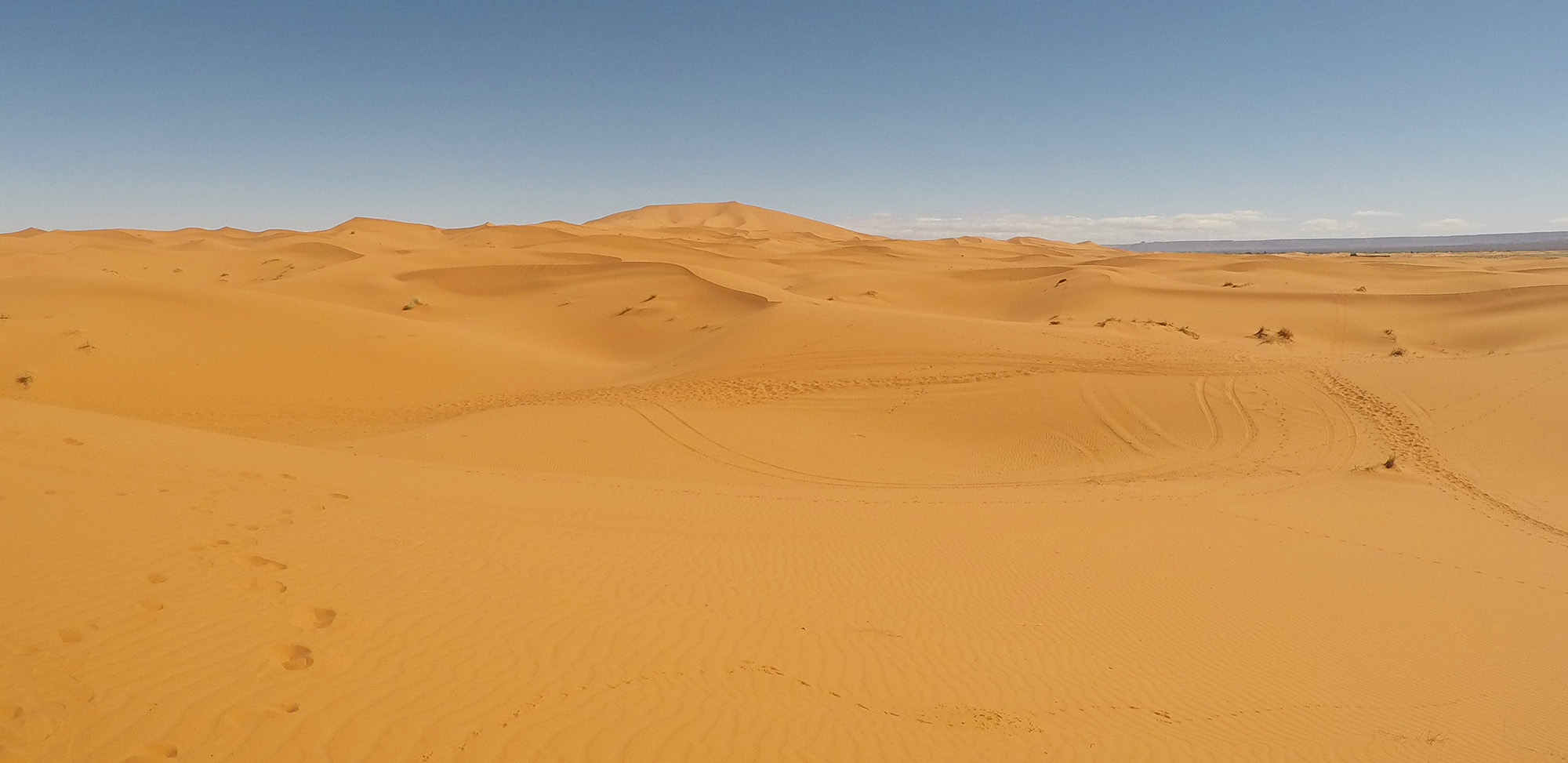
The camp is battered by a strong wind; even lying down is a challenge because the sand carried by the gusts gets everywhere. And when I say everywhere, I really mean everywhere. But, by now, the spirit of the race has taken possession of us, turning us into perfect Tuaregs, and no one is bothered anymore.
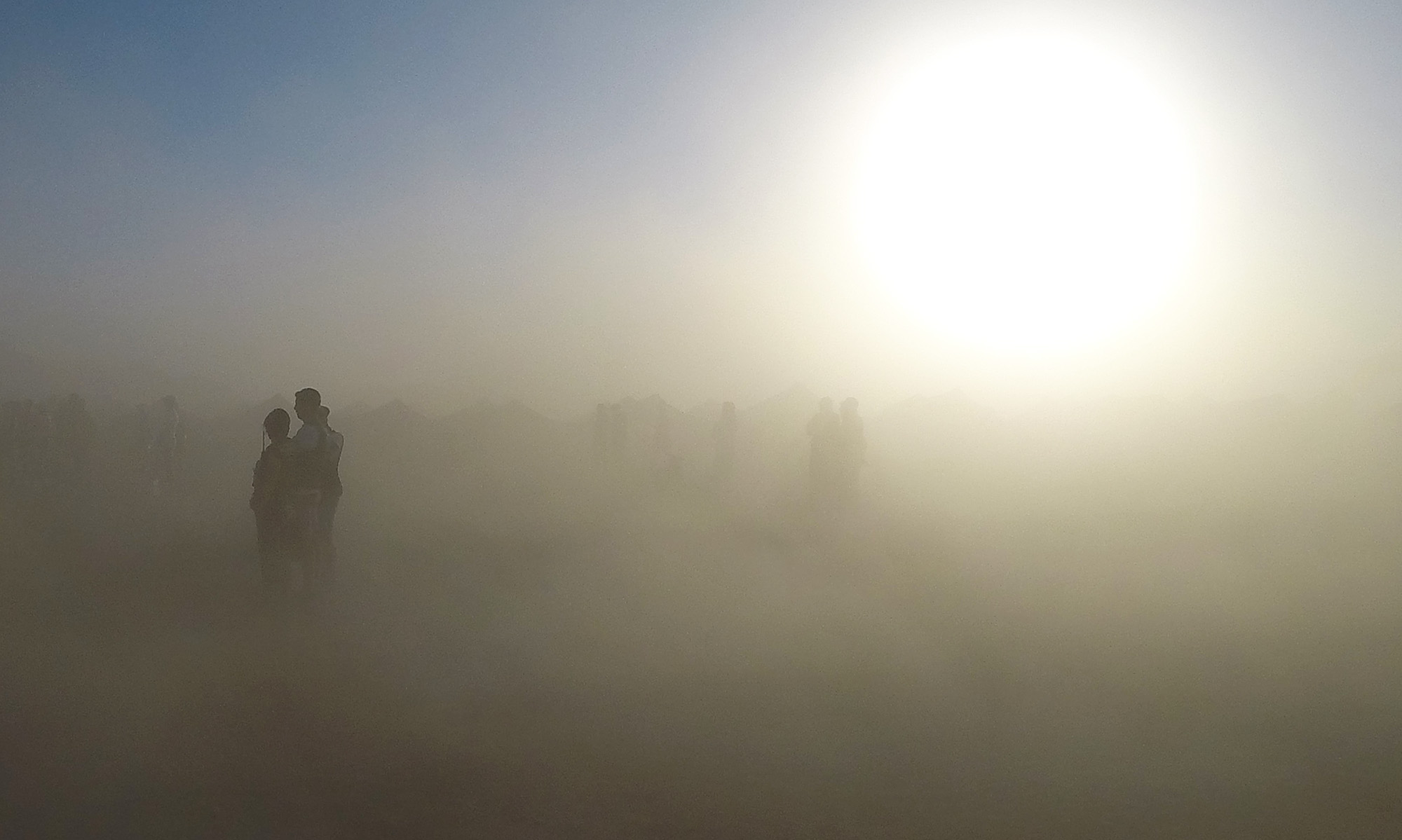
The wind shows no sign of waning; on the contrary, it rages on, and at two o'clock in the morning, in a sandstorm, it even pulls some of the tents, making them fly away and forcing the organisation personnel to pull down all the poles, blocking the roof canvas with pegs above the competitors' heads. The situation is borderline claustrophobic but at least we won’t be buried in sand. The next day, as if nothing happened, when the sun comes up, we emerge from the tarp and are ready to run again. It is as if something primeval has awakened in us, a primordial instinct so that as soon as we wake up, we are ready to run after prey, after our dreams or away from our demons.
I begin to realise that the MdS is not just a self-sufficient stage race in the desert...
On the third day, the route is rockier with climbs, descents and ridge crossings. Fortunately, the desert isn’t only made of sand but it also features magnificent rock formations. The view from the top of the jebels is wonderful and reminds me of how small we are in this desert. I realise how much the organisation, in the thirty-three editions of the race, has not made any logistical compromises to take us into the middle of the Sahara desert. The isolation from civilisation is extreme: in fact, for seven days we do not encounter any human settlements. I am sure that tomorrow on the longest stage I will pay dearly for this rush of euphoria, but I am having the time of my life, finally on solid ground on which I can push.
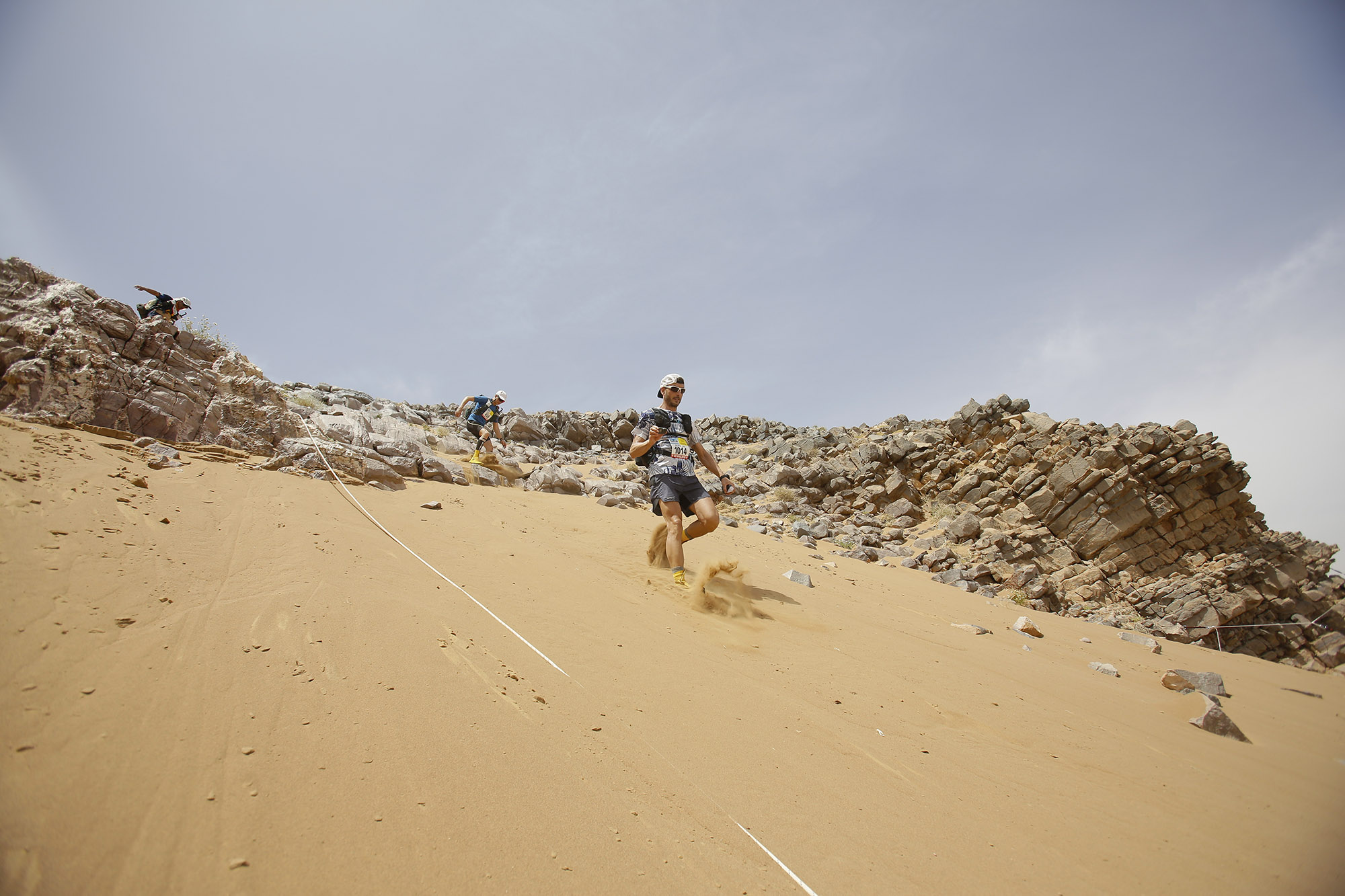
In fact, perhaps due to the fact that I start with the second group, I feel extremely hot during stage four. When we set off the camp has already been completely dismantled; standing one next to the other, we start behind a line drawn in the ground, the only sign of our presence. After the first twenty kilometres I am forced to slow down noticeably. I see waves of heat rising from the ground, I can't eat, the food I have seems little and inadequate for the length of the stage. Instead of trying to react I let myself be swept by bad thoughts. I am afraid, I must admit, I am afraid that my calculations were wrong and that I will not make it. I advance very slowly, the kilometres in the sand are endless, it seems impossible to run in these conditions. At each checkpoint I pour one of my two bottles over myself to lower my body temperature, I stop to enjoy the momentary chill and do not notice time passing. The wind that blew in our faces for three days is now absent. I no longer struggle. Stupidly, I keep thinking about the distance left to go and that after it we still have the last stage to go, which is as long as a marathon. When, at last, the sun sets and night falls, I try to react to my fears. Without fail, a strong headwind rises, taking buckets of sand from the dunes and throwing them in my face. The scenario is even more disturbing in the light of the headlamp illuminating the sand that rushes towards me like a veil between me and the desert. I am forced to put on my sunglasses and crank the the headlamp up to full blast. For a moment I think about how all the sand I am breathing will get out of my body, but I realise that it is better not to think about it. As often is the case, when I realise that, despite everything, I can make it, in the last twenty kilometres I start running again, immediately realising that I have foolishly succumbed to fear. I made a mistake in the long stage that was supposed to be more congenial to me. Here, too, I didn't f***ing understand a thing. I was just happy to see all the members of the Italian expedition arrive. More than two hundred kilometres have been covered by our shoes and this draws smiles on the sunken faces of us all. The finish line is no longer so far away.
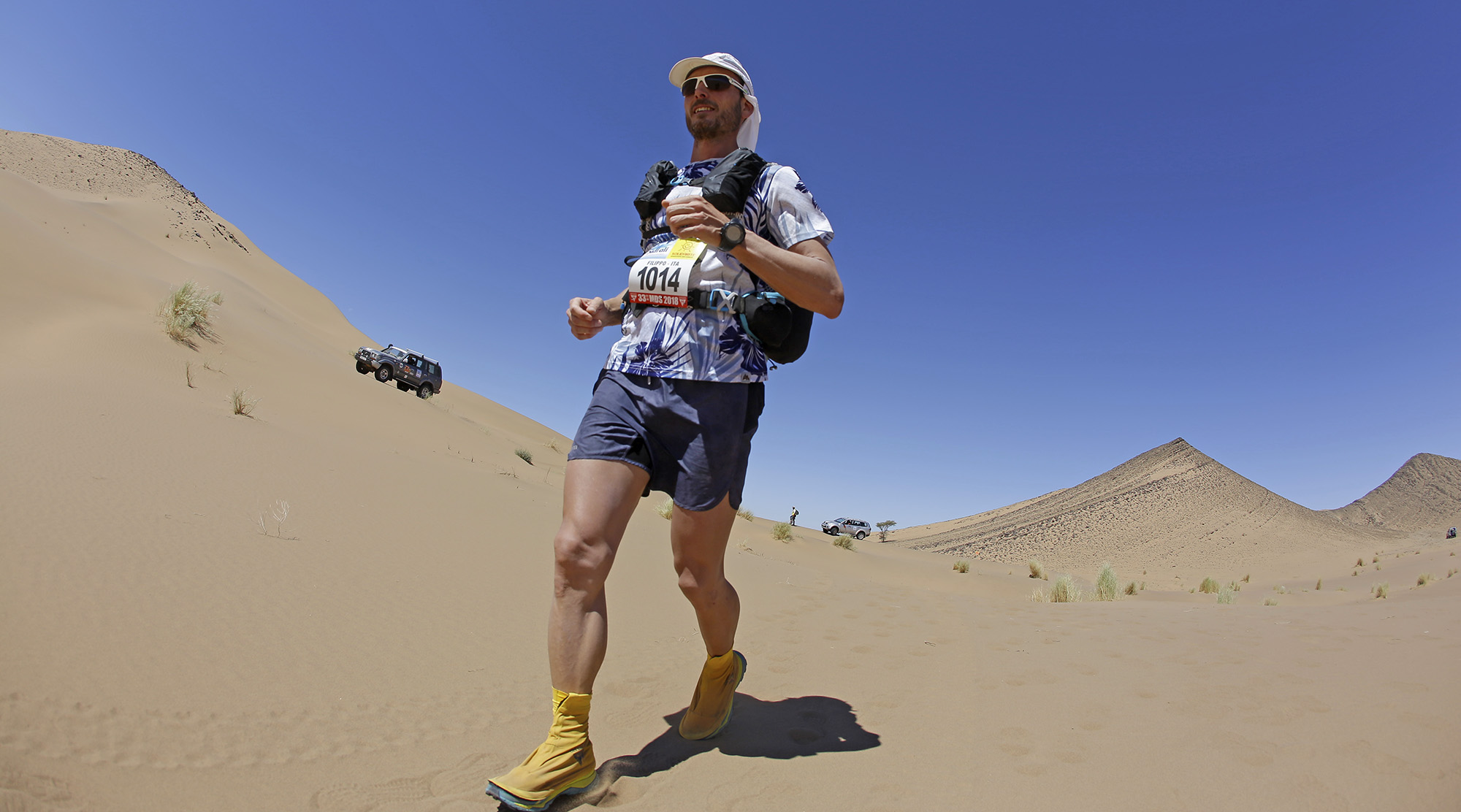
In the hours that separate us from the last stage, we dip into our food supplies, trying to store up as much energy as possible for the last effort.
I can't get to sleep, conflicting thoughts crowd my head, I get out of my sleeping bag to clear my head in the cold night air. The darkness is not disturbed by any artificial light, the moon has not yet risen, I look up and the dome of heaven is there, barely an inch from my face. Its beauty is disarming, there are stars, constellations, nebulae that I had never seen, I feel like I am inside one of those water spheres with glitter in them. This is one of those moments when you understand your place in the world and reconnect with nature, with your nature.
I don't care about the ranking anymore, I don't even look at it. On the last day I run as hard as I can, just for myself, and I arrive, happy to have done my best, at the end of the last timed stage. I stop for hours to watch the finishers and see more tears in the eyes of the latecomers than in those of the first to arrive. The next day all that awaits us is a collective walk in the dunes, obligatory but not timed.
It will be very hard to return to everyday life after such an experience.
Running every day through the desert has something ancestral about it, living with little, without electricity, running water, telephone, getting up when the sun rises, falling asleep when it sets, sharing the difficult moments and the wonderful ones with others, all this is a real return to the origins of man.
Indeed, MdS is not just a race and, now, I have realised that too.
PS: for a week, day and night, I wore our HAWAII II TECH T-SHIRT, our BRYCE SHORTS and our ENDURANCE HAT. A bit dusty, but they held up great.
